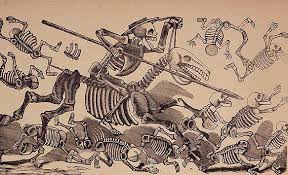
Don Quixote as calavera by Mexican caricaturist José Guadalupe Posada
Anyone who really knows me is well aware that my secular Bible, my book número uno in world literature, is Miguel Cervantes’s Don Quixote. That has been the case since my senior year in high school when I took on Walter Starkie’s translation and afterwards wrote on the chalkboard in Mr. Beckley’s English classroom, while no one else was present, the following couplet from a fictitious elegy to our good knight – who by the end of Book Two (spoiler alert!!!) has died:
He had the fortune in his age
To live a fool and die a sage.
A straighter version, from Edith Grossman’s more strictly accurate rendering, is: “for it was his great good fortune / to live a madman, and die sane.” I still prefer the first to any alternative I have seen, mostly because it so charmingly captures the rhyme (in an aabba pattern in the original) that occurs between lines 1, 2, and 5, but nowhere in Grossman’s still justly acclaimed version:
Tuvo a todo el mundo en poco,
fue el espantajo y el coco
del mundo, en tal coyuntura,
que acreditó su ventura
morir cuerdo y vivir loco.
I had read an abridged and probably heavily adapted version of The Adventures of Don Quixote about three years earlier, in ninth grade, and immediately identified very personally with Don Quixote’s noble character. I sensed that, if he was mad, it was a spiritual or holy madness, that the titlting at windmills and all the slapstick were not the main point. Since then I’ve learned (most acutely after reading Vladimir Nabokov’s lecture notes on the subject) that the physical and psychic cruelty both knight and squire suffer in their earliest adventures is nothing to be laughed at; and, besides that, it is part of the mechanism by which readers are brought to understand that what they are reading is much deeper and more substantial than a raucous, comic satire against the ancient books of chivalry. Perhaps it even suggests the point at which Cervantes himself realized what kind of a book he was actually writing.
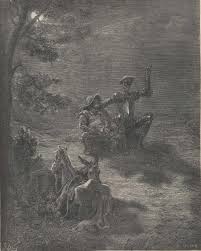
Don Quixote and Sancho by Gustave Doré
Don Quixote, as Nabokov rightly insists, is not comedy but high tragedy. The real humor in the book, and this goes a long way to softening the impact of its tragedy, is in the delightful and humanizing conversation between knight and squire that runs like a stream of healing water through the whole of it.
The range of Cervantes’s tragedy is multifarious and exists on many planes. The one that has provoked me to write today is the tragedy of Spain’s expulsion of the Jews and, with their new religion of Islam, the “infidel” Moors from its borders. I think it has something to say to our current international predicament.
#
![3912286779_544f6531d3[1]](https://brettalansanders.files.wordpress.com/2015/12/3912286779_544f6531d31.jpg?w=500&h=380)
Moors’ Invasion of Spain
Most of them stayed, only a few returning to their distant forebears’ northernmost Africa. But the Moriscos, the ones who stayed, were still persecuted, forbidden even from wearing their traditional clothing or taking baths. A common charge, in the malodorous air of the Spanish Inquisition, was that “the accused was known to take baths” – a suspiciously sensual indulgence to which the typical Spaniard of the day was little inclined.
“The sound of water to these desert people must have had something mystical about it,” writes John A. Crow in Spain: The Root and the Flower (Third Edition). Indeed, dazzled by the relative trickle of the Guadalquivir River, the Moors made the land they called Al-Andalus “blossom like the watered rose.” Daily washings were part of their religious ritual, Crow explains,
and one has but to roam through any of their palaces or gardens today to become aware of how much flowing water meant to them esthetically. Their finest architectural gems are inseparable from large reflecting pools and fountains. Their lovely gardens are possible only because of the constant flow of water. As a consequence of their own great love of water the Moors very naturally thought that the Christians never washed at all. “They were sprinkled with water at the time they were born, and thus relieved from washing for the rest of their lives” (p. 61).
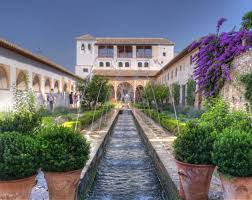
The Alhambra in Granada, Spain
One clue to the Moors’ “mystical” relation to water is found in their sacred book the Quran (or Koran):
God hath promised to Believers,
Men and women, Gardens
Under which rivers flow,
To dwell therein,
And beautiful mansions
In Gardens of everlasting bliss.
But the greatest bliss
Is the Good Pleasure of God:
That is the supreme felicity. (ix. 72)
Aside from these Muslim invaders’ superior cleanliness, the Moors and the Jews together were the crucial element in the greatest flowering of arts and sciences in Christian Spain. A particularly bright moment was during the 13th-century reign of the Castilian king Alfonso X: Alfonso the wise or learned, “the scholar king.” His reign is remembered especially for its religious tolerance and his collaboration with Muslim and Jewish scholars in order to “mold a Spanish culture out of roots that were Greco-Roman, Islamic, Hebraic, as well as Christian and Castilian” (p. 97, emphasis in original).
“The culture of the Arabs,” Crow writes,
was superior to that of the Christians in many ways. In the first place, its technical superiority was obvious. The Moors were better agriculturalists, better engineers, better architects, better tradesmen, better manufacturers of tiles, textiles, leather goods, armor, swords; they lived in better houses, they had larger cities, their lands were more fruitful and they possessed more things of all kinds than the Spanish Christians. But material wealth was not their only point of superiority. They were also more widely read, they were better philosophers, physicians, poets, musicians, and artists.
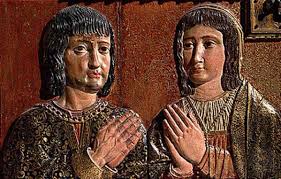
King Ferdinand and Queen Isabella
What the Spaniards had going for them, on the other hand, was what helped them to win the long Reconquest of the whole of Moorish Spain: “They were superior,” Crow writes
in individual drive, in stubborn will, and indefatigable energy, in the resolution to prove themselves the equal of any man […]. Their reservoir of inner strength was greater. They did not depend on outside things, but only on what they had inside themselves. Each individual soldier was a dynamic universe. Each man’s soul was in constant heroic tension. Each man’s faith was epic. The forward thrust of their collective might was irresistible. (p. 96)
The Moors, likewise, in the parts of Spain that they had subdued and held onto, were tolerant rulers in their way. They allowed Christians to practice their own faith, under mild restrictions of other sorts and the imposition of a special tax. That was the custom within Islam from the Arabian to the Iberian peninsula, so long as the resident Jews and Christians were not actively seeking the destruction of their religion.
It is true that the Quran contains passages that might conceivably be construed as justification for the indiscriminate “holy war” that some extremist groups (claiming to represent Islam) are waging today. But those passages – no more nor less than similar ones in the Hebrew Bible or Old Testament – must be read in the context of the time in which they were written. In any case, the Quran itself gives ample proofs of the counter-assertion of much greater numbers of 21st-century Muslims: that theirs is at core, despite the unfortunate actions of a violent minority, a peaceable religion . Take this passage, to start with:
Those who believe in the Quran,
And those who follow the Jewish scriptures,
And the Christians and the Sabians,
Any who believe in the Last Day,
And work righteousness,
Shall have their reward. (ii. 62)

The Koran
Elsewhere, too, the Quran speaks of Christians and Jews who (like Muslims themselves) live by the precepts of a holy Book, and focuses on the principles of spiritual living that cross all borders. Consider, for instance, this verse, a personal favorite of mine:
It is not righteousness
That ye turn your faces
Towards the East or West;
But it is righteousness –
To believe in God
And the Last Day,
And the Angels,
And the Book,
And the Messengers;
To spend of your substance,
Out of love for Him,
For your kin,
For orphans,
For the needy,
For the wayfarer,
For those who ask,
[…]
And practice regular charity,
[…]
And to be firm and patient,
In pain or suffering
And adversity
And throughout
All periods of panic.
Such are the people
Of truth, the God-fearing. (ii. 77)

The sacred words in Arabic
Even so, in the rush of righteous satisfaction spawned by Christian Spain’s successful Reconquest and by the ensuing subjugation of much of indigenous America, no righteous act or intention of those people of the Other book was given any quarter. King Philip III expelled them en masse between 1609 and 1611: in other words, about six years after the publication of Book One of Don Quixote and about four years before that of Book Two.
#
Even in Book One of Don Quixote, Cervantes pays special attention to the political and social “problem” of Moors and Moriscos. The first intimation of this comes in Chapter IX, which is also the first chapter in Part Two. I will use Edith Grossman’s translation from here on out.
“In part one of this history,” Cervantes narrates at chapter’s onset,
we left the brave Basque and the famous Don Quixote with their swords raised and unsheathed, about to deliver two downstrokes so furious that if they had hit the mark, the two combatants would have been cut and split in half from top to bottom and opened like pomegranates; and at that extremely uncertain point, the delectable history stopped and was interrupted, without the author giving us any information as to where the missing parts could be found. (p. 65)
![k2-_6824672d-6b6f-4c25-be75-598b29366a3b.v1[1]](https://brettalansanders.files.wordpress.com/2015/12/k2-_6824672d-6b6f-4c25-be75-598b29366a3b-v11.jpg?w=500) At this point, distraught over that unfortunate accident, Cervantes happens to stumble on a manuscript – “in characters I knew to be Arabic,” he writes – and looks around for some Morisco who could interpret it for him. To make a long story short, the manuscript turns out to be the lost “History of Don Quixote of La Mancha. Written by Cide Hamete Benengeli, an Arab Historian.” Then, before finishing the story of the Basque and the Manchegan knight, Cervantes the light-hearted ironist makes this famous observation about the history and its author:
At this point, distraught over that unfortunate accident, Cervantes happens to stumble on a manuscript – “in characters I knew to be Arabic,” he writes – and looks around for some Morisco who could interpret it for him. To make a long story short, the manuscript turns out to be the lost “History of Don Quixote of La Mancha. Written by Cide Hamete Benengeli, an Arab Historian.” Then, before finishing the story of the Basque and the Manchegan knight, Cervantes the light-hearted ironist makes this famous observation about the history and its author:
If any objection can be raised regarding the truth of this one, it can only be that its author was Arabic, since the people of that nation are very prone to telling falsehoods, but because they are such great enemies of ours, it can be assumed that he has given us too little rather than too much. So it appears to me, for when he could and should have wielded his pen to praise the virtues of so good a knight, it seems he intentionally passes over them in silence; this is something badly done and poorly thought out, since historians must and ought to be exact, truthful, and absolutely free of passions, for neither interest, fear, rancor, nor affection should make them deviate from the path of truth, whose mother is history, the rival of time, repository of great deeds, witness to the past, example and adviser to the present, and forewarning to the future. In this account I know there will be found everything that could be rightly desired in the most pleasant history, and if something of value is missing from it, in my opinion the fault lies with the dog who was its author rather than to any defect in its subject. (pp. 68-69)
Perhaps this ironizing is part of Cervantes’s strategy to keep himself and his brainchild safe from the Inquisition, but in any case it is a brilliant technique that attaches whole new levels of unreliability to the whole and the parts of this “true history.” As in the novel’s first sentence – “Somewhere in La Mancha, in a place whose name I do not care to remember, a gentleman lived not long ago …” (p. 19) – we have every reason to question the authenticity of almost any part of these narratives that come down to us. Or, as happens increasingly between knight and squire, or between either or both of them and multiple others encountered on their wanderings through the world, the truth lies somewhere within the meeting of those various perspectives. But be that as it may, if we harbor some doubt about whether the former soldier, Cervantes, really thought of his Arabian narrator as a dog, it might seem somewhat less likely after encountering the “history of the captive” (one of several interpolated tales) toward the end of Book One.
![images[3]](https://brettalansanders.files.wordpress.com/2015/12/images3.jpg?w=500)
Illustration for the captive’s tale in Don Quixote
pulled his beard and tore out his hair and threw himself on the ground, and once, when he called out as loud as he could, we heard him cry:
“Come back, my beloved daughter, come ashore, I forgive everything! Give those men the money, it is already theirs, and come and console your grieving father, who will die on this desolate strand if you leave him!”
Zoraida heard all of this, and she grieved and wept at everything and could only respond:
“Pray to Allah, dear father, that Lela Marién [her name for the Virgin Mary], who is the reason that I am a Christian, may console you in your sorrow. Allah knows I could not help doing what I did […]” (p. 363)
The story that should remove all doubt, though, about the great humanity of our author Cervantes, appears at two separate moments toward the end of Book Two. First, when Sancho Panza is returning to Don Quixote from a stint as the governor of an “island” somewhere in the landlocked sea of Castile, he comes across an old acquaintance from his village in La Mancha. Ricote, one of the expelled Moriscos who has been abroad looking for a hospitable place for his family to stay, is on his way home to recover their buried riches before calling for his family (believed to be in Algiers) to Germany where he has decided to settle.
![102014327_univ_lsr_md[1]](https://brettalansanders.files.wordpress.com/2015/12/102014327_univ_lsr_md1.jpg?w=500)
Moriscos’ expulsion from Spain
But what transpires some time later, after Don Quixote and Sancho have made it as far as Barcelona and its Mediterranean shore, puts flesh on the real suffering and upheaval of a people that otherwise – like Middle Eastern refugees in our day, their masses huddled at European and American borders – are mere statistics, proclamations, moral abstractions. In this instance, our faithful knight and squire are being entertained with a visit to the galley ships and become witnesses to a gun battle offshore. Two of the Spanish soldiers on deck are shot dead by two drunken Turks on the other boat, and the admiral general has promised to hang them all when “one of the handsomest and most gallant boys the human mind could imagine” (p. 878) is brought before him as their captain.
Except that the boy is actually a girl in disguise. “‘I am not of Turkish nationality, or a Moor, or a renegade,’” she says. “‘I am a Christian woman.’” And then, before the death sentence can be carried out, she is allowed to tell her story: “‘I was born to Morisco parents and am of that nation, more unhappy than wise, upon whom a sea of afflictions has lately poured down’” (p. 879). She was taken to Algiers by two uncles, “‘by force rather than by [her] will,’” despite her protestations that she is a Christian: “‘as in fact [she is], and not one of the false or apparent ones but a true Catholic Christian,’” daughter of Christian parents: “‘I drank in the Catholic faith with my mother’s milk,’” she insists; “‘I was brought up with good morals; neither in my speech nor in my behavior did I give a sign of being a Morisca.’” As for the place where her uncles settled her: “‘it was as if we had settled in hell itself’” (p. 880).
She ended up placed, to put things briefly, on this ship for the purpose of retrieving the family’s wealth for the Moorish king who covets it as well as her; and was then betrayed by the greedy and insolent Turks who were supposed to put her ashore in Christian clothes that she brought with her, but instead decided to keep her while they went in search of further prizes (p. 881). “‘This is, Señores,’” she says at last, “‘the end of my lamentable story, as true as it is unfortunate,’” and all she requests is “‘that you allow me to die as a Christian, for as I have said, in no way have I been guilty of the offense into which those of my nation have fallen.’”
![19806_catalan-government-accused-of-politicizing-17th-century-engraving_2_large[1]](https://brettalansanders.files.wordpress.com/2015/12/19806_catalan-government-accused-of-politicizing-17th-century-engraving_2_large1.jpg?w=500)
Ships on Barcelona’s Mediterranean shore, roughly 17th century
“As the Christian Morisca was recounting her strange history,” Cide Hamete (or some complicit other) narrates,
an ancient pilgrim who had boarded the galley with the viceroy had not taken his eyes off her, and as soon as she finished speaking, he threw himself at her feet and embraced them.
“O Ana Félix, my daughter! I am your father, Ricote, who came back to find you because I cannot live without you, for you are my soul” (p. 882).
Then, as the girl rushes into her father’s embrace, Ricote confirms to the others that she is his daughter, “‘more unfortuante in what has happened to her than in her name’” (which, like feliz in today’s Spanish, means “happy” or “fortunate”); “‘I left my country,’” he goes on, “‘to look in foreign lands for a land that would welcome and shelter us,
and having found it in Germany, I came back dressed as a pilgrim, in the company of other Germans, to find my daughter and retrieve the great riches I left hidden here. […] If in the integrity of your justice our small guilt, and her tears and mine, can open the doors to mercy, then show us mercy, for we never thought of offending you, nor did we ever agree in any way with the intentions of our people, who have so justly been expelled.”
At which point Sancho, in the voice of the practical farmer he is, with his deep-seated aversion to getting mixed up in other people’s business, pipes in that he knows them both and that the part about their identity is true; but, “‘as for this other business of coming and going and having good or bad intentions, I have nothing to say about that’” (pp. 882-883). The daughter, of course, is at that point promptly pardoned.
![images[6]](https://brettalansanders.files.wordpress.com/2015/12/images6.jpg?w=500)
Monument to Cervantes; image suggestive of “The Little Gypsy”
On the other hand, though, let us not be too smug about how advanced our thinking has become over the intervening centuries. For are we not the same people who are presently debating not only whether to accept Muslim refugees into our midst (as we did not accept Jewish children fleeing the Holocaust), but even whether to allow our current population of Muslim Americans to exist here in peace? Should we burden them with identity cards, the demagogues among us ask? Or with scarlet letters tattooed on their foreheads or sewn onto their clothing? Or should we close or burn down their mosques? Or “round them up” and put them in concentration camps as we did, during the second world war, to our Japanese American countrymen? Or maybe just surveil them into fearful compliance with every aspect, however dubious, of the strict orthodoxy of our 21st-century American exceptionalism.
May our friend Cervantes’s exalted literary rhetoric suggest to us how to answer the demagogic purposes, prejudiced assumptions, and distorting rhetoric of the warmongers, fearmongers, and all variety of other vile mongers who afflict us in our troubled times. Because the snake oil they’re selling can only bring further hatreds and divisions; constantly shrinking civil liberties and ever-rising civilian and military casualties; and a precious few’s perpetual profits, directly or indirectly, from the never-ending war economy that President Eisenhower once tried to warn us about: all the social, economic, educational, ecological, and other goods that a civil society might legitimately ask of its government up in smoke.
#
We tend to forget, when we talk about Islamist extremism and the escalating attack on “our American way of life,” that for one thing we are not the only people in the world who have ever experienced or are experiencing terror. Nor, though it rub us the wrong way to admit it, are our foreign enemies the only ones who create terror. Imagine, for instance, that you are the woman crouched under a table at a Planned Parenthood clinic praying not to be one of the women murdered by the moment’s extremist Christian assassin, leaving your two small children without a mother. Or that you are the child who has just lost family, friends, neighbors in yet another mistaken U.S. drone strike on a traditonal wedding party (or school, or hospital) in Afghanistan or Pakistan. From your point of view at that time and place, who are the terrorists and who the terrorized?
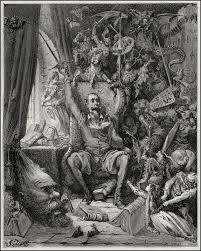
Don Quixote in his library, by Doré
Among the great themes of Don Quixote is the puzzling question of reality and illusion: step into the role of knight-errant and, to the degree that you inhabit the role, knight-errant you are. Will yourself to believe in the precepts of any religion, and set yourself to living by them, or by some sadistic distortion of them, and the experiences of the spirit or of its evil caricature will become real to you; proving nothing except for the sure existence, on some plane or other, of your reality.
Don Quixote sees marauding giants where Sancho sees some windmills. Later our good knight sees the famous helmet (yelmo) of Mambrino where his long-suffering squire sees a barber’s basin (bacía). When a dispute arises over the ownership and the physical nature of that object, clever Sancho invents a whole new reality with his invented word: baciyelmo (for which the best we are able to do in English is the hyphenated “basin-helmet”).
Now, sure, there is the comedic element there. We can safely say that, to human perception at least, grass is generally green and sky, blue. Don Alonso Quixano’s wits are restored to him when he lays aside his chivalric identity as Don Quixote; he himself admits that a helmet is a helmet and a basin a basin, dismissing all his recent adventuring as tomfoolery. None of which stops those who have loved the frequently lucid lunatic from being as sad as Sancho when he casts off the noble dream, surrendering to the limitations of the flesh and of the physical and political world as it exists; nor can we deny the evidence of literature and the arts – and the unplumbable depths of the human soul – that Don Quixote lives and has remained continually alive in the world in countless incarnations.
What is more – and this is a vital and essential point – watch what happens when different people, or political parties, or nations, or the adherents to revolutions both reactionary and radical, armed and unarmed, discuss some noble abstraction like democracy, freedom, peace, security, capitalism, socialism, righteousness, good and evil. We all mean different things by those words and others that we so thoughtlessly (and sometimes maliciously) bandy about; and there is no clear empirical test to forever settle which definitions are right – if any of them are; and under what contingencies. Which is not to say, on the other hand, that issues cannot be argued and reasonable solutions reached through a dialogue that sets itself up as shared inquiry as well as persuasion – and in the place of coercion. Cervantes’s perspectivism is not a valueless, merely secular humanism (he was himself a Catholic or Christian humanist) without moral or ethical compass, but it does forego the absolutist’s illusion – secular or religious – of certainty; in favor, instead, of the necessity of honest dialogue, negotiation, diplomacy: those essential trappings of civilization and humane culture that the demagogues of every place and time (our present Presidential cycle not excepted) are so intent on tossing out like baby with bath water.
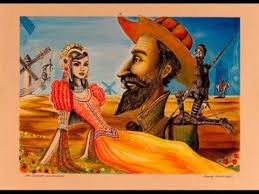
Don Quixote conjuring his beautiful Dulcinea
It is my quixotic wish that as a nation we might aspire to reach beyond the narrow confines of our private interests: to see the world, and even our homeland, in its multicultured splendor and points of view. Then, along with the fearmongering and demagoguery that is our present fare, we might throw out the new Berlin walls and “No Room at the Inn” signs that scar our landscapes. Instead of all that: let all the streams of healing waters, from celestial, terrestrial, or subterranean gardens everwhere, pour over us.

Thanks for your musings. What a shame that in 500 years, instead of progressing, we have devolved on the issue of the “other”; on our ability (or inability) to get past labels and fear to find compassion for our fellow humans, regardless of their religious or ethnic background.
wow.. marvelous piece.
Very insightful. An outstanding article re an outstanding author and his great book. Thank you
You write…The Moors invaded Spain in the year 711, less than a century after the prophet Muhammad had formed the new faith.
Not strictly true. Mohammad did not form a new faith (as such). He is recorded to have said: “I wish to bring back the religion of Abraham:”
Thus: monotheism IS the faith. All the rest is confection.
Thank you for your comment. You do understand, of course, that to the general public (including educated public), Islam is understood to be distinct from either Judaism or Christianity and thus constitutes a new faith, or at least, a new religious tradition. While your point is well taken, then, I feel that, as a basic rhetorical principle, in this and many other cases the “strictly speaking” falls outside the scope and purpose of the particular argument and its more general audience.
Thank you for your response. The educated public is just that, ‘educated’. Education usually means a lot of dogma (I used the word confection). Real education has little to do with dogma. All four pillars of monotheism, Abraham, Moses, Jesus, Mohammad, were not ‘educated’ – they followed an inner guidance. Biblically speaking “the still small voice” or the Islamic “whisper from the soul”. Mr Sanders, this is made confuse because the four great prophets are seen as religious leaders and not as mystics and had nothing to do with education. What is of interest is What, or Who, makes people and things go.
Your love of the Don seems to represent a delightful search for the ideal. My wish is that you will find satisfaction.
All the very best – Lawrence
Author’s bio: Lawrence Brazier was born in Oxford, England. He is married and has five children and now lives in Austria. He is a German/English translator and a widely travelled and published journalist, mostly on religious affairs (published clips available) humor and travel. Also interested in metaphysical matters and Oriental ceramics. Lawrence and his wife, Romana, translate voluntarily texts from the German for diverse Third World agencies. Published in Interreligious Insight, World Journal of Faiths, Crisis Magazine, The Fountain – plus many other publications to other themes.
Thank you for your good wishes, which I return to you in kind.
Dear Mr Sanders. I suspect you wish to terminate our conversation (no blame attached). But please bear with me just one more time. Illumination is with us. Many years ago I was stunned to read that “…the real children of God know not what they do.” This quite obviously implied a sort of naive approach to life, something also akin to the three wise monkeys (hear, see, speak no evil), and above all Christ’s being in the world but not of it. The noble Don echoes all of these traits. His utter belief in goodness…! I now believe I can feel where your inner world is located. Of course I wish you well. But beware dear brother and, again, check that word ‘perverse’. “Father forgive them for they know not what they do.” (Pity the poor writer who is more often than not in a mental state.) The mob that was instrument in the Crucifixion did know what it was doing, but on the other hand and at another level they had no idea of what was the driving force. Sigh! I have an article written about the nature of God that would over-fill one of these panels, it you wish to see it please instruct. Best to you and yours – Lawrence
I would be happy to see your essay. I am sure the larger format will help me to better understand and appreciate your point of view. I value any opportunity to enter into dialogue with thoughtful and passionate conversants. Please send to brettalansanders@gmail.com and I will have a look at it as soon as possible.